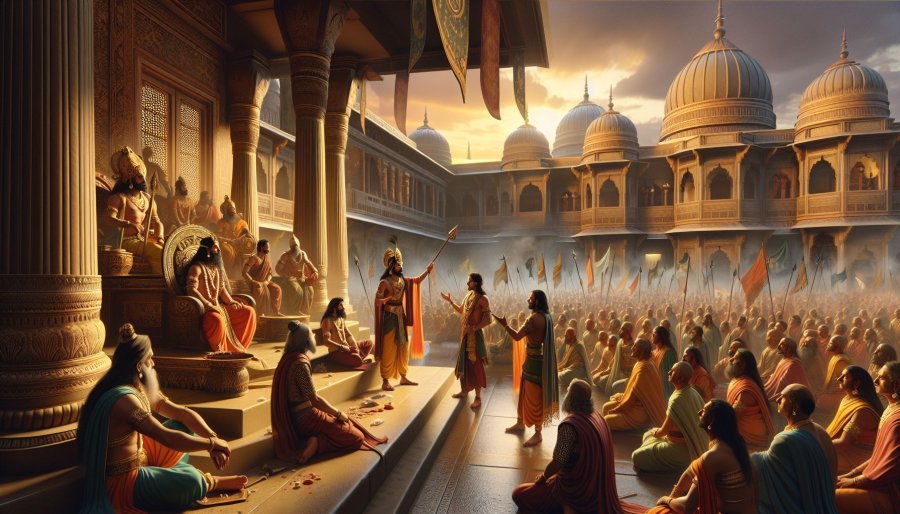Section XXXVI [summary]
Book index: Mahabharata (English)
This page contains a summary of the Mahabharata Section XXXVI including examples of moral lessons in daily life. The Maha-Bharata is one of the largest epics ever written containing roughly 100,000 Sanskrit verses. It deals with the legendary history of ancient India and contains a large number of interwoven tales.

Short summary of the chapter:
Sisupala, a member of the Kuru race, criticizes and questions the decision of Yudhishthira, the son of Pandu, to worship Krishna, who he believes is not deserving of royal worship. He questions why Krishna is being honored over other more worthy kings, preceptors, and warriors present at the assembly. Sisupala accuses Yudhishthira of acting out of meanness and insult, rather than virtue. Despite Sisupala's objections, Yudhishthira continues to offer worship to Krishna, causing Sisupala to leave the assembly in a huff along with other kings who agree with him. This highlights a conflict between traditional hierarchies and personal loyalties in the story.
Full English translation:
This page is merely a summary which is automatically generated. If you are looking for authentic sources such as the Sanskrit text or the Full English translation of Mahabharata Section XXXVI, have a look at the following articles:
Section XXXVI, online text
English translation by Kisari Mohan Ganguli.
Read this and other chapters online.
Mahabharata (English Summary)
by Kisari Mohan Ganguli | ISBN-10: 8121505933
Buy the latest edition:
FAQ of Section XXXVI:
What was Sisupala's issue with Krishna receiving royal worship?
Sisupala believed Krishna was not worthy of royal worship and questioned why he was honored over other esteemed kings and warriors present at the assembly.
Why did Sisupala consider Yudhishthira's actions inappropriate?
Sisupala criticized Yudhishthira for offering royal worship to Krishna, questioning his morality and intention behind honoring someone who was not a king or deserving of such respect.
How did Sisupala view Krishna and his acceptance of the worship?
Sisupala believed Krishna was unworthy of the royal worship he received and saw his acceptance of it as a form of insult to the other monarchs present at the assembly.
Mahabharata Section XXXVI in daily life:
In the story shared, Sisupala objects to the exceptional honors given to Krishna, arguing that other more conventionally qualified individuals were present who could have been honored instead. His arguments are rooted in traditional markers of social status and merit like royalty, kingship, and recognized positions such as preceptors or sacrificial priests. Sisupala's refusal to acknowledge Krishna's worthiness based on his perceived lack of traditional qualifications highlights the importance of understanding and valuing intrinsic worth over societal titles or roles. This narrative can teach us the significance of recognizing and respecting individuals for their inherent qualities and contributions, rather than merely their titles or societal roles.
In everyday life, it's essential to appreciate people around us for their unique talents and virtues, without solely judging them based on their outward status or titles. Acknowledging someone's efforts and qualities fosters positivity and encourages the individual to continue contributing their best. Moreover, by focusing on the inherent value of people rather than their external identifiers, we can build more inclusive and supportive communities. This story thus serves as a reminder to look beyond societal labels and to honor the inherent worth and contributions of each individual.
